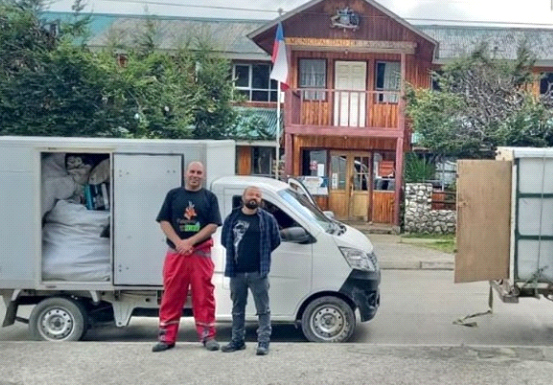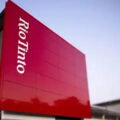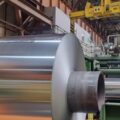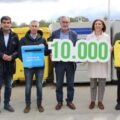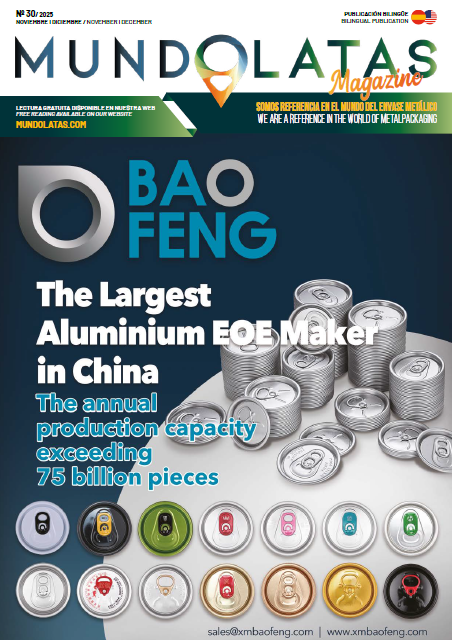In 2015, they started under the name ‘Fecunda Patagonia’, but have now evolved into a brand that aims to transform the tourist region into a nature reserve. The project, which will take five years to complete, will focus on treating different types of household waste.
The company called Patagonia Sin Residuos began its journey slowly and gradually. Initially, in 2015, it was called Fecunda Patagonia and was dedicated to the recycling of non-hazardous waste. During this time, they noticed that the children in the schools knew how to properly separate waste, but the people in charge of collecting the garbage simply dumped it all together in a truck that then took it all to the landfill.
Eight years ago, the organization Fecunda Patagonia opened the first Ecopoint in Coyhaique, allowing the community to deposit their waste and adopt more sustainable habits. Over time, they expanded their recycling services to several local companies. In addition, that same year they established a shed in downtown Coyhaique to manage household waste, including its separation, treatment and temporary storage. In December 2016, after four months of operation, they managed to recycle ten tons of waste and send it to other companies in the country.
During that period, the company Fecunda Patagonia used the “reverse logistics” method, i.e., they waited for empty trucks to return north from Aysén so that they could send their waste to other companies that could recover it. Ahuile mentioned that the first big decision they made was whether to work with only the most valuable waste or to make a difference by accepting all types of waste. In the end, they opted for the latter and received all types of waste.
The organization Patagonia Sin Residuos, formerly known as Fecunda Patagonia, took an important step in May 2018 by forming an alliance with the company RECIMAT. Together they created a campaign to recycle used batteries in the Aysén Region, managing to collect more than 21 tons during the remainder of the year. These batteries were transported to RECIMAT’s recovery plant in Calama to give them a second use or value.
During the last four years, the campaign has been active and has already collected around 250 tons of batteries from all over the Aysén region, from La Junta to Villa O’Higgins. Although there are still some localities to participate, such as Guaitecas and Chile Chico. The success of this initiative is due to the collaboration of the community and to the fact that the municipalities understood that this is a problem that must be solved jointly.
The future integrated center will allow the recycling of various types of waste, such as lubricating oils, disused batteries, construction and demolition debris, household garbage and end-of-life tires. The community thanks the municipality and municipal council for their support in resolving the problems related to waste management in the region.
Feisal Ahuile is in charge of managing operations at Patagonia Sin Residuos. At the end of 2020, the Asociación de Empresas y Profesionales por el Medio Ambiente (AEPA), together with Patagonia Sin Residuos, initiated its first Environmental Sanitation Program in the Aysén Region. This program consisted of collecting hazardous waste such as used lubricating oil (ALU) and end-of-life batteries (BFU) in municipalities such as Tortel, Ibáñez, Cochrane, Coyhaique and Puerto Aysén. These materials were sent to Coronel to be recycled and converted into alternative fuel. Due to the pandemic, Patagonia Sin Residuos began to offer recycling services at people’s homes because they could not travel to the collection points.
After forming an alliance with AEPA, the business group in charge of environmental care, Belinda and Christian Nodal had the opportunity to meet the PTH Group. As of September 2022, they joined the group and together they are dedicated to recycling under the name Patagonia Sin Residuos, in reference to the environmental movement ‘Patagonia Sin Represas’ (Patagonia Without Dams).
According to Ahuile, it is relevant that the name of the project reflects everyone’s commitment to caring for the region. Although it is not a direct reference, it shows that they are part of a citizen, community and business movement with the presence of responsible entrepreneurs interested in implementing positive changes. In addition, the other partners of Patagonia Sin Residuos include Cristian Rojas as general manager, Matías Broussaingaray as finance and commercial manager, Paulina Monsalve as head of administration and human resources, and Álvaro Rojas and Fernando Zurita as project directors.
According to the organizers, the name chosen for this initiative is a reflection of everyone’s commitment to caring for the region. Although not directly mentioned, they are part of a movement that includes responsible citizens, communities and entrepreneurs who seek to generate positive changes.
Currently, Patagonia Sin Residuos provides complete services for the proper management of waste, whether domestic or industrial. In the case of the latter, they are also in charge of hazardous waste management through adequate preparation, temporary storage at the place of origin, collection, transportation and final disposal or safe and correct treatment using equipment and vehicles authorized for this task as mentioned on their website.
Patagonia Sin Residuos also has an educational focus in its recycling work. They have partnered with the Loberías del Sur hotel to work with five schools in the region to manage plastic bottles and aluminum cans. After three months, the students were awarded a trip to Laguna San Rafael. In addition, together with the Tourist Interest Zone and Sernatur, recycling days were held throughout the region, collecting eight tons of plastic bottles and aluminum cans in just four months.
A month ago, Patagonia Sin Residuos’ largest project began to take shape after signing an agreement with the Municipality of Coyhaique. This entity granted the company an 18,000 square meter space on loan for 20 years, where a complete center for recycling and the circular economy will be built for the entire Aysén Region.
There is private investment that will be used to directly address the problem of the Coyhaique landfill, as it is reaching the end of its useful life. The only option is to implement a proper recycling system for the final disposal of the waste, according to Ahuile.
The construction of an integrated recycling center is becoming increasingly urgent due to the fact that in summer, the number of visitors arriving in the region exceeds the total population of the territory. Although 80% of the population is concentrated in two places (Coyhaique and Puerto Aysén), tourism activity takes place in other areas. For this reason, it is important to have several management points to cover all the territories and create an efficient network, according to the representative of Patagonia Sin Residuos.
In the city of Coyhaique, located in Chilean Patagonia, a circular economy is being promoted through the creation of an integrated recycling center. This initiative, promoted by the local municipality and known as “Patagonia Sin Residuos” (Patagonia Without Waste), seeks to promote recycling and reduce waste generation in the region. With this strategy, we hope to implement a sustainable system that will help preserve the environment and promote responsible habits in the community.

